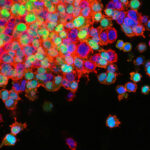Zika Conspiracy Theories and Twitter
Last month, researchers writing in the journal Vaccine warned that the success of a Zika vaccine currently in development could be jeopardized by the proliferation of pseudoscientific claims and conspiracy theories on social media platforms like Twitter.
Social media is an active forum for the anti-vaccine community, the researchers wrote, and it has the potential to counteract public health information and stymie vaccination efforts with rumors that, for example, link the spread of Zika virus to genetically-modified mosquitoes, or blame pesticides for the rise in microcephaly. The work illuminates the challenge public health officials face in combating misinformation in an age of social media.
By analyzing more than 130,000 tweets that mentioned the words “Zika” and “vaccine” in the first four months of 2016, the researchers found that pseudoscientific claims and conspiracy theories rose rapidly and in near lock-step with increased mention of Zika among mainstream news outlets, health organizations, and government agencies on Twitter overall.
“The rise in these conspiracies is happening just as quickly as people are becoming aware and talking about Zika,” said Mark Dredze, an assistant research professor of computer science at Johns Hopkins University.
Of course, as Dredze pointed out, the anti-vaccine messaging made up only around one percent of the total tweets mentioning Zika and vaccines. But the anti-vaccination messaging on social media remains powerful enough to sway parents susceptible to such messaging, Dredze said, and it now appears that the anti-vaccination community has turned Zika conspiracy theories into popular talking points.
That raised another interesting question for the researchers: Were the Twitter accounts that were floating pseudoscientific information about Zika part of the larger anti-vaccination community on the network? Looking back into a year’s worth of Twitter data, Dredze and his co-authors were able to trace the social media history of users making the pseudoscientific claims. They found that 86 percent of those users had tweeted generally about vaccines in 2015, and that 19 percent had previously tweeted an anti-vaccine message.
“It’s a large community and if that community adopts Zika as part of their narrative, it makes their case much stronger,” said Dredze, pointing to the psychological literature on how difficult it is to persuade those whose beliefs are deeply entrenched. “Once people believe this, it will be hard to change their minds.”
All the more reason to study how anti-vaccination messaging emerges on social media and identify ways doctors and public health agencies can combat misinformation. After all, Dredze said, public health officials don’t want to be in a situation “where we go to inoculate a population and find that a lot of people think a Zika vaccine is dangerous. That’s not the right time to start educating them.”










